April 3, 2015 | Posted in JAZZ | By Jason Sositko
Not groundbreaking music, but still pretty good:
I will not insult your intelligence by saying the 1980’s music from Miles Davis is as good or even close to being as groundbreaking as the earlier time periods of his music. I can say however, the music is unfairly maligned, and certainly should not be treated as an afterthought.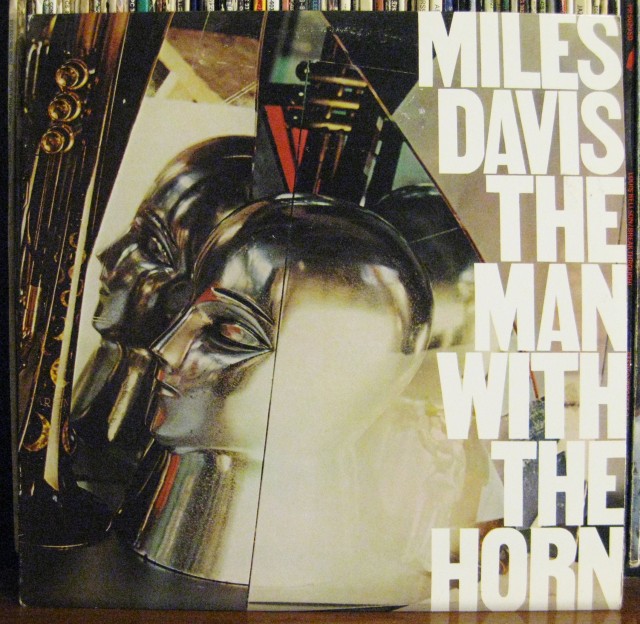
At the end of 1980 Miles arose from a 5 year personal and professional oblivion, to make a comeback that portrayed him as an elder statesman of jazz, even if the music he was playing then barely resembled jazz music.
Most people were just glad he survived the late 70’s, any music he could give us was a bonus. The first album The Man With the Horn was a little shaky, but as the decade went on Miles developed his final decade sound:
A particularly icy tone to my ears, a tone that was equally mysterious, and vulnerable, definitely different from his trumpet tone of the 70’s.
His 80’s style still had some of the 1975 Agharta/Pangaea voodoo funk leanings, but this time, much smoother around the edges. Also Miles personality became smoother around the edges as the decade progressed.
2 great books that highlight this time period
If you’re interested in reading more about Miles’ specific day-to-day life, I highly recommend 2 books that focus on Miles’ life in the 70’s and or the 80’s: Miles Beyond: The Electric Explorations of Miles Davis 1967-1991 from Author/Guitarist Paul Tingen.
The Last Miles, The Music of Miles Davis, 1980-1991 from author George Cole. Both Books dig deep into the electric years time periods. The Tingen book is indispensable in my opinion for a Davis fan trying to make sense of the electric period of the 70’s, as session and musician details are focused on as well as the personal story.
Both books highlight great stories of Miles’ interaction between band mates, record labels, and yes, hilarious run ins with neo-cons like Wynton Marsalis.
1982 Grammy Awards performance
Grossly overlooked music
When I first started my journey with Miles Davis, I did not gravitate to the post 1980 music of Miles that’s for sure. My biggest complaint is the relative tameness, some of it sounded very over produced. Of course by 1980’s pop music standards, it was in-line with what was going on at the time.
Other than Kind of Blue and Porgy & Bess, “the first 2 albums I heard from Miles, I found a home within the 68-75 music, Bitches Brew, Big Fun, Get Up With It, Agharta, Dark Magus and the like.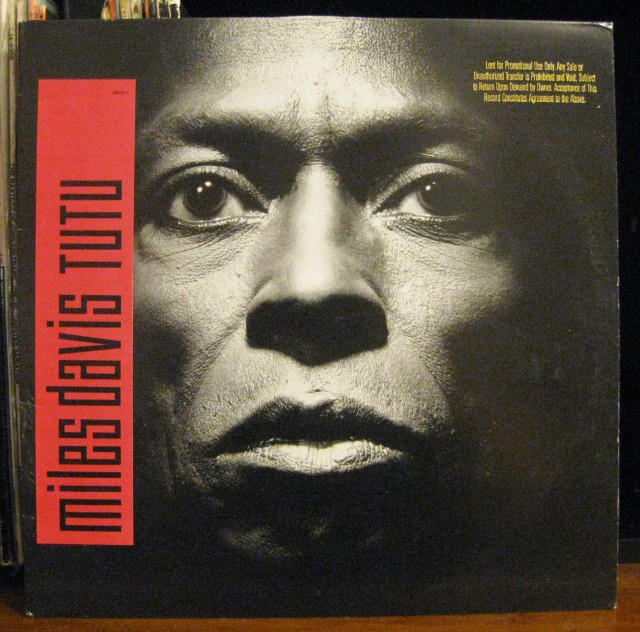
My first recollections upon hearing the 80’s music for the first time:
For one thing, the new wave sound is undeniable, that early to mid 80’s synth sound, icy cold and sinister?
The Music was not at all warm and inviting like the 50’s music, or progressively edgy as the late 60’s and 70’s music was.
I always felt the 80’s music was lacking something, the music seemed, dare I say “conformist”? Where was Dark Magus?
After 15 years of Miles listening under my belt, and a revisiting of the 80’s music, I think it is obvious that I underestimated this period of Miles’ music. The originality of it is quite high, the style and sound is pretty unique, if indeed easier to digest for mainstream audiences.
Miles trumpet is also unique, his sound at times is just evil sounding, I used the word sinister above for the icy synth sound, Miles doubles this sound on his horn. The more I hear the music and his playing it really is pretty solid.
It bares repeating, I am mainly considering the studio work of Miles around this time, if you have had a chance to hear the live document We Want Miles and any of the Montreux Concerts, things CAN open up a bit.
The music mostly hearkens back to the mid 70’s Cosey band style at times, but typically, things don’t go over board like on those 70’s shows… which not exactly what I want to hear.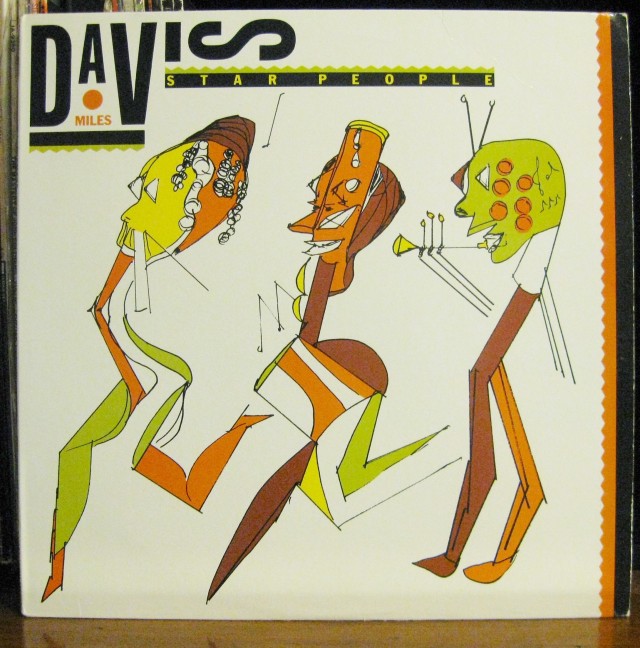
Miles carefully sculpted a sound though, that was both contemporary and original, yet still ALL him; all be it, him in a fusion Miles sort of way.
It is also interesting to note some of the outfits he wore, and how colorful they were, the style was more his own and less a Sly meets Hendrix wardrobe of the 70’s.
The 1980’s music is broken up into two periods, the Columbia years and the Warner Brothers years, though most of the music from both labels has a similar vibe.
Probably the best album during the entire decade was Aura: A musical suite that combined classical, progressive rock touches, new wave, bebop, funk, and rock to offer an album that is unlike most of his 80’s output.
The Miles Davis 80’s Albums
In retrospect I think Aura is the one studio album from the 80’s that can be added to the rest of decades past great albums, to complete the cycle of Miles, an album Miles reportedly did not even want to make the album.
Producer Palle Mikkelborg plays the Gil Evans role here, and Miles gives him quite a bit of latitude.
Aura was released in 1989, 4 years after it was recorded by Columbia, 4 years after he went to Warner Brothers. I bet it irked Warner that 4 years after Miles joined their roster, the best album released during that period was a Columbia project?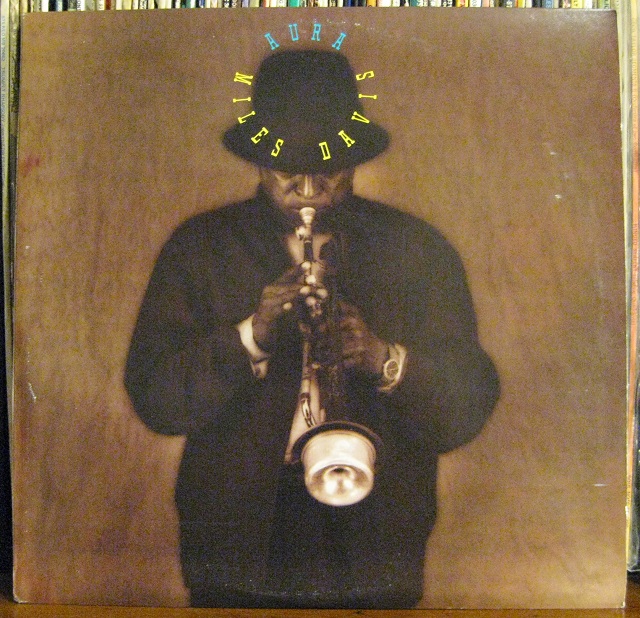
Todd S. Jenkins of All About Jazz wrote that he thought Aura blended Miles’ electric music and the Gil Evans arranged Big Band music perfectly, I agree. Aura won the 1990 Grammy for best instrumental jazz performance.
So what about the rest of the music? Well, albums like Star People, Decoy, Amandla, Tutu, and Doo Bop were all about that vibe of funk meets jazz, but believe me the sound is unique. I don’t remember hearing too much else that sounded exactly like these albums during the 80’s.
Possibly the most underrated album of the 80’s is the album Siesta: Basically a bassist Marcus Miller solo vehicle, Miller plays nearly every instrument on the album outside of the trumpet. Siesta was a soundtrack for an obscure film. The thing about it is it sounds influenced by arranger Gil Evans, in particular Sketches of Spain.
Miles plays some really familiar sounding trumpet on Siesta, he doesn’t have that icy tone I have noticed in 80’s, he sounds vulnerable and that familiar cracked tone is back, Siesta really is something to hear.
In my opinion Aura is the last masterpiece Miles Davis recorded, and probably the only real push the envelope piece of music after his 1975. Don’t get me wrong, I liked Star People, and the live document We Want Miles a bit, and all the 80’s stuff is worthy of listening to.
Aura is a different story, Sure it still has an 80’s vibe, I always thought there was a New Wave rock vibe on Aura, the Icy cold production adds to this as well.
Palle Mikkelborg Produced and arranged this music, to be quite honest, from things I have read about these sessions, I am not sure how much miles dug this music or even wanted to be at the sessions. Considering how he was at odds with Columbia Records during the Wynton Marsalis feud, but Miles reportedly needed the money, so he had to do it.
It turns out, Miles liked the album and experience, the music is quite good and unusual enough to hold ones interest. In fact, after maybe a dozen listens, I have no problem calling this Miles’s last great piece of music.
“Electric Red” form Aura
Why is Aura short-changed?
I think Aura may get the short end of the stick because Palle Mikkelborg composed the entirety of the music, and Those Miles Legacy protectors might be uncomfortable with Palle Mikkelborg being the man behind it, and getting so much credit for the music.
I suppose the best way to describe Aura is, big band fusion jazz, maybe even third stream rock fusion. With the classical element that floats through the music, that third stream vibe is there.
It has such a strange sound that Columbia didn’t even release the music for 4 years, long after he had left for Warner Bothers, For me it sounds like an ECM record, the guitars and synthesizers are icy cold.
There are some busy African style drums that mix it up from time to time to still give you that “Miles funk” vibe. In some ways I can hear styles that harken back to Get Up With It, In particular the epic “He Loved Him Madly” with the shifting moods especially.
Miles himself plays wonderfully on Aura, lyrical as ever, and plenty of post bop mid 60’s style runs, and a few classic 70’s fusion quotes,
“Blue” from Aura
The production is also great, each instrument is well recorded with plenty of vibrance, the bright popping electric bass is up front in the mix.
All the tracks on Aura are named after what Palle Mikkelborg says were the colors of Miles’ Aura, that may be a little to deep for my Country Fried steak and Biscuits and gravy mind, but I do like the way the music comes together. Over the years it has really grown on me.
When I listen to this music with headphones, many shades of blue and green come in to my mind’s eye, I also see those colors with Kind of Blue and In a Silent Way for what that’s worth?
All in all I have really grown to love this album, I think it has to do with my Progressive rock fondness, and admiration of some European Players like Terje Rypdal and Jan Garbarek.
Aura reminds of that ECM style and production very much, I am glad Miles decided to allow the flattery of Palle Mikkelborg’s suite for Aura, it is a completely unexpected masterpiece within the Miles Davis Discography.
The Warner Brothers albums
If you’re new to Miles and really were looking for a few from the 80’s, I would start with Aura, then I would head over to We Want Miles, Star People, and Decoy, from the Columbia stuff.
Then I would get the Warner Bros. albums Siesta, Amandla, and, Tutu. Miles last studio album was Doo-Bop, a heavily influenced by hip hop album, that has grown on me a little, even if the rapper on the album “Easy Mo Bee” sounds a bit dated. The non vocal tracks I actually don’t mind.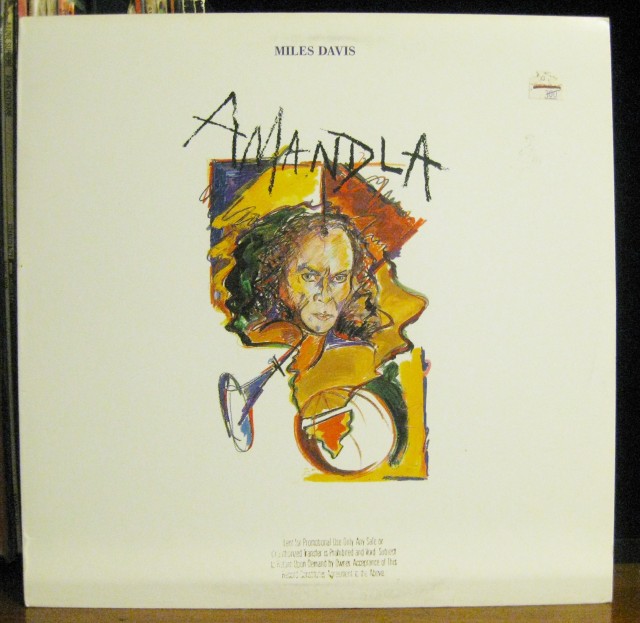
I think it might be a good idea to separate the 80’s Miles from the rest of his music, and not judge it against Kind of Blue, perhaps consider it a world-weary man easing into his sunset?
It’s music that is very good, with a unique sound and style that says: “Yeah it’s the 80’s, and I am Miles Davis, I deserve this?
Also if you are vinyl collector like me, Miles Davis happens to still be very affordable to collect. Miles was so popular that much of his early records, especially the 60’s, and 70’s, stuff were big sellers, and quite plentiful.
You can easily get a clean 1959 copy of Kind of Blue for less than $50.00 if you look around. Only rarer deep groove Prestige, and Blue Note vinyl seem to be out of control price wise. The vintage Japan only releases like Dark Magus and Black Beauty are pricy, I paid nearly $60.00 each for my copies several years ago.
You can get most of these 80’s titles for less than $10.00, only the late 80’s releases, like Aura and Doo Bop seem to be rising pretty fast, as the late 80’s were the end of the LP era, and probably as many CD’s were pressed as records, making the vinyl fairly hard to come by.
Tutu live
*All photos are my own from my own LP collection*
Related posts at Spacial Anomaly
Table of Contents
Jason Sositko
Jason Sositko, a freelance writer and entrepreneur is a participant in the Amazon Services LLC Associates Program, an affiliate advertising program designed to provide a means for sites to earn advertising fees by advertising and linking to Amazon.com. I also use services such as Viglink and Skimlinks to earn income via links placed inside articles.
6 Comments
Leave a Reply
*
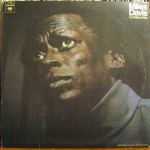
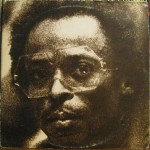
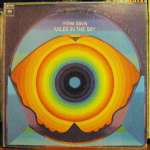
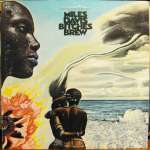








sandy
April 3, 2015
I can tell you love Miles. I do read your posts when I get a chance. I love his music, but I’m not as well versed in the details as you. However, I thought you’d like to know people are reading. I became interested in Miles because:
1) A baby boomer who enjoyed Jazz at one point in my life.
2) Miles used the services of a woman, Terrie Williams, who was a social worker, years ago. She was one of his first PR clients and after working with Miles she went on to being a PR consultant for many celebrities. Over time she shifted away from PR and is now an outspoken voice on Depression in minority communities. She’s written some other self help books as well. But Miles was pivotal in her life and career story.
3) I also adore Cicely Tyson who had a strong connection to Myles. I don’t know all the intricacies of their relationship, but nevertheless that connection makes me think of him.
4) Miles is one of my hubby’s favorites.
Thank you for keeping his visions alive through writing.
Jason Sositko
April 3, 2015
Thank you Sandy, I appreciate your kind comments. I try not to get too immersed in the music theory part of jazz when writing about it. Sometime it seems that the reviews are written by music teachers for their students, and not the casual, or even devout non musician fans.
Rob
June 4, 2015
I am glad i am not the only person who thinks Miles’ later works are criminally underrated. Also agree that Aura is unique and his best of the period and nothing else like it. I imagine it is because you were only discussing studio albums but would also like to mention Live Around the World. Miles sounds weaker at that point but the ideas and emotion still there while other guys (particularly Kenny Garrett) absolutely kill on tunes. Great album.
Jason Sositko
June 4, 2015
Thanks Rob: I think most people that dislike the 80’s music didn’t care much for the late 60’s and early 70’s either. Seems the biggest division comes when the Warner Brothers years are discussed, Tutu and Amandla seem to be dismissed as nothing but lite hip hop. I like both albums quite a bit, even Doo Bop isn’t that bad.
Rob
June 8, 2015
Yes, as far as the 70s, there are a lot of people who hate what Miles did with On the Corner which is perhaps his best album as far as I’m concerned. It’s all subjective I guess.
Rob
October 9, 2017
Miles was ahead of his time, so the majority of us are just catching up to his vision. These 1980’s albums, I’m sure, contain many “hip” rhythm combinations, melodies, original compositions, improvisational explorations, etc. He never rested on his laurels, very rarely repeated himself in his improvisations, had very high standards, had the experience of playing with the greatest musicians, when he was coming up and organized the best musical talent in the world, as the leader of these groups. “Kind of Blue” changed the direction and style of music. Despite having the greatest improvisors in his bands, his own playing held it’s own with his unique sound and note selection, impeccable feel & time. His intuition in music was near infallible. All of these elements should make us want to explore all the phases of his career.